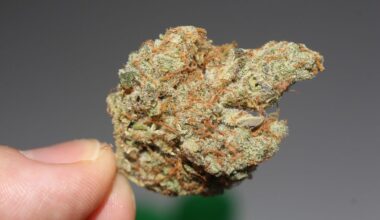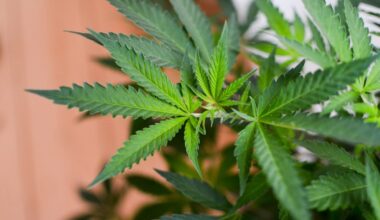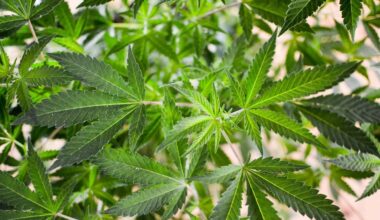A key congressional committee met on Tuesday to consider more than 1,200 amendments to a large-scale defense bill, including about a dozen measure related to marijuana and psychedelics. Several of those major proposed drug policy reforms have now been cleared for votes on the House floor this week.
The House Rules Committee took up the National Defense Authorization Act (NDAA), determining which amendments could be made in order for floor consideration. Most—such as measures covering cannabis banking, medical marijuana recommendations for military veterans and the therapeutic benefits of psilocybin for military personnel—made the panel’s cut and are now set to be considered by the full chamber.
Lawmakers have tried to attach drug policy reform to NDAA in past sessions, with mixed results. For the current Fiscal Year 2023 bill, however, there seemed to be even wider, bipartisan interest in using the defense bill as a vehicle for cannabis and psychedelics policy.
Two marijuana measures were already added to NDAA in the House Armed Services Committee, including one from Rep. Anthony Brown (D-MD) that concerns cannabis sentencing standards under military code, mandating that the Military Justice Review Panel “develop recommendations specifying appropriate sentencing ranges for offenses involving the use and possession of marijuana.”
Another amendment that’s been attached to the bill, sponsored by Rep. Seth Moulton (D-MA), would require the Department of Defense (DOD) to research marijuana as an opioid alternative for military members with certain health conditions.
Two lawmakers—Reps. Alexandria Ocasio-Cortez (D-NY) and Matt Gaetz (R-FL)—recently filed separate but substantively identical measures to expand that research objective by also including psilocybin and MDMA. The Democratic-led measure was made in order to proceed to the floor, while its GOP counterpart was not. A separate Republic-led psychedelics proposal is advancing, however.
Gaetz discussed his proposal during Tuesday’s Rules meeting, stating that he’s “seen extensive evidence regarding the ability of psilocybin and MDMA to be very helpful to veterans going through PTSD and other forms of traumatic brain injury.”
Here’s an overview of the amendments that were made in order and will receive votes on the floor as soon as Wednesday:
Rep. Ed Perlmutter (D-CO): Safeguard banks that work with state-legal marijuana businesses from being penalized by federal regulators.
Rep. Nancy Mace (R-SC): Allow Department of Veterans Affairs (VA) doctors to provide medical cannabis recommendations to patients and also prohibit federal employers from discriminating against veterans who use, or have used, marijuana.
Rep. Alexandria Ocasio-Cortez (D-NY): Require DOD to research psilocybin and MDMA, as well as marijuana, as opioid alternatives for military members with PTSD, traumatic brain injuries or severe pain.
Rep. Dan Crenshaw (R-TX): Allow the secretary of defense to approve grants for research into the therapeutic potential of certain psychedelics such as MDMA, psilocybin, ibogaine and 5–MeO–DMT for active duty military members with post-traumatic stress disorder.
Rep. Katherine Clark (D-MA): Expresses the sense of Congress that VA should not deny home loans to veterans because they they derive income from a state-legal marijuana business. The proposal was initially introduced as an outright prohibition of such denials, but was changed to a nonbinding form.
Rep. Rashida Tlaib (D-MI): Require DOD to study the “historically discriminatory manner in which laws related to marijuana offenses have been enforced, the potential for the continued discriminatory application of the law (whether intentional or unintentional), and recommendations for actions that can be taken to minimize the risk of such discrimination.”
Rep. Earl Blumenauer (D-OR): Codify that VA doctors can “assist veterans in providing recommendations, opinions, and completion of the forms” to become state-legal medical cannabis patients.
Rep. Alexandria Ocasio-Cortez (D-NY): Prevent the use of funds for aerial fumigation on drug crops in Colombia, a practice widely criticized by reform and human rights advocates.
Rep. Mikie Sherrill (D-NJ): Eliminate the federal sentencing disparity between crack and powder cocaine.
—
Marijuana Moment is tracking more than 1,500 cannabis, psychedelics and drug policy bills in state legislatures and Congress this year. Patreon supporters pledging at least $25/month get access to our interactive maps, charts and hearing calendar so they don’t miss any developments.![]()
Learn more about our marijuana bill tracker and become a supporter on Patreon to get access.
—
Here are the proposed drug policy amendments that were not made in order:
Rep. Matt Gaetz (R-FL): Require DOD to research psilocybin and MDMA, as well as marijuana, as opioid alternatives for military members with PTSD, traumatic brain injuries or severe pain.
Rep. Lou Correa (D-CA): Make it so DOD would have to work with VA on any studies into cannabis an an opioid alternative.
The coalition for this issue includes me, Crenshaw and @AOC.
And the Rules Committee isn’t giving us a vote of the full house.
— Matt Gaetz (@mattgaetz) July 13, 2022
Perlmutter’s banking measure is his latest attempt to get the reform enacted through whatever legislative vehicle possible. The House attached the proposal to NDAA as a floor amendment last year, but it was later taken out in negotiations with the Senate.
“I’m trying to figure out every path possible to get this thing done so that fewer people are killed,” Perlmutter said on Tuesday in committee, referring to deadly robberies at cash-intensive dispensaries. “And this does involve international cartels, so that really is the nexus to the NDAA, the criminal international component to this.”
With respect to the Crenshaw amendment on psychedelic research, the Rules Committee did not make an earlier version of that measure in order for floor consideration last year, and the text was not revised since then.
He said on Tuesday that the measure would help pave the path toward a “new and innovative way to treat our service members, and give them a chance to continue to serve while taking part in treatment that can help them function not just in uniform, but in life.”
“We had this opportunity a year ago to pass this into law, but we did not. It was not made an order,” he said. “We cannot lose another year with suicides rates the way they are. We should not be forcing our service members or veterans to use nonprofits and go down to Mexico to get this treatment to save their lives. We should be looking into it, at least, ourselves.”
The Rules Committee listened, and now the full House is set to vote on the measure this week.
Meanwhile, a bipartisan bill to provide military veterans with access to medical marijuana was reintroduced in Congress last month, with Blumenauer and Rep. Brian Mast (R-FL) as the chief sponsors.
The reform, which is identical to committee-approved versions from past years and also cosponsored by Cannabis Caucus co-chair Rep. Dave Joyce (R-OH), was previously pursued through the appropriations process as an amendment.
Image element courtesy of Kristie Gianopulos.
Medical Disclaimer:
The information provided in these blog posts is intended for general informational and educational purposes only. It is not a substitute for professional medical advice, diagnosis, or treatment. Always seek the advice of your physician or other qualified healthcare provider with any questions you may have regarding a medical condition. The use of any information provided in these blog posts is solely at your own risk. The authors and the website do not recommend or endorse any specific products, treatments, or procedures mentioned. Reliance on any information in these blog posts is solely at your own discretion.







